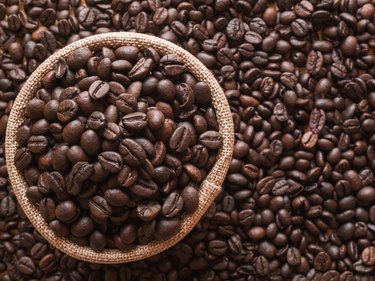
The caffeine fix from coffee may be an integral part of your morning routine. But it turns out you can still get a caffeine boost, and some other health effects, from the drink's original form — coffee beans.
Coffee beans serve the same purpose as the beverage in many ways, though the way you ingest the caffeine is a bit different. They may provide the same health benefits of coffee, but may also trigger heartburn, stomach issues, problems sleeping and possibly anxiety.
Video of the Day
Video of the Day
Getting Your Caffeine Fix
Caffeine — the most important part of your coffee drink — is the world's most widely consumed psychoactive drug, according to a study published in Frontiers in Psychiatry in May 2017_._ It can often provide you with that needed boost to focus, but it can also swing in the other direction and make you jittery and anxious if consumed too much.
A regular cup of coffee contains about 95 milligrams of caffeine on average, though that may depend on the type of coffee you're drinking. A single coffee bean, meanwhile, contains about 6 milligrams. The difference is that coffee beans (before being diluted with water to brew coffee) are far more concentrated than coffee.
You'd have to eat a good deal of coffee beans, however, to get the same caffeine fix as you would sipping a cup of joe. And while there's not much research on whether eating coffee beans will provide you with more caffeine faster, a study published in Sports Medicine in March 2018 found that certain types of caffeine administered orally — like caffeinated aerosol mouth sprays — may enter your system faster by being absorbed through your mouth rather than through your stomach.
Whether coffee beans will give you much more extra jolt through chewing or through their higher concentration isn't entirely clear. But on afternoons when you need a little boost and don't want to indulge in an entire cup of coffee, snacking on some chocolate-covered espresso beans may give you that extra little lift you need without the full caffeine intake. As long as you keep your caffeine intake level to about 400 milligrams per day, you should be safe.
Health Benefits of Coffee
While the scientific community seems to swing back and forth occasionally on the health benefits of coffee, it's safe to say that there's a great deal of strong evidence supporting its positive aspects. A review of meta-analyses published in November 2017 in the BMJ found that coffee consumption was more likely to benefit your health than harm it.
And according to Harvard Health Publishing, coffee consumption has been associated with improved cardiovascular health and reducing the risk of Type 2 diabetes, Parkinson's disease and certain types of cancer.
There aren't many studies showing that eating coffee beans or even eating coffee grounds (yes, it's doable) have the same effect on your health as drinking regular coffee. But we can assume that eating coffee beans may still be more helpful than harmful to your health. One study published in the Journal of Agriculture and Food Chemistry in December 2012 found, in fact, that coffee grounds actually contained more antioxidants than the beverage.
Acid Reflux and Heartburn
There are, however, a few things to be careful about when eating coffee beans. Just as drinking regular coffee (which is high in acid) can cause gastrointestinal issues, so can coffee beans.
Gastrointestinal reflux disease, or GERD, is also sometimes referred to as heartburn and can make consuming coffee difficult. With GERD, acid and digestive enzymes flow back up from your stomach into your esophagus, causing burning and pain. Drinking coffee or eating coffee beans may aggravate that or other stomach issues, so stay aware of what you're feeling in your digestive system when you're getting your caffeine fix.
Read more: Can Coffee Cause Bloating?
Meddling With Your Sleep
Perhaps the most common concern of too much caffeine is the obvious: It can impair your sleep and make you too anxious. A study published in Sleep Medicine Reviews in February 2017 found that caffeine was overall associated with less sleep time, worse sleep efficiency and waking up more often throughout the night. And the anxiety when you've drunk too many cups of coffee too quickly is never a good feeling.
But that can all be changed by limiting your coffee intake and consuming it moderately. Just like when you drink coffee, eat your coffee beans in moderation. Instead of eating the entire bag of coffee beans in one sitting, munch on them slowly at your work desk, and savor the taste and the little caffeine boost one at a time.
- Frontiers in Psychiatry: "The Safety of Ingested Caffeine: A Comprehensive Review"
- Sports Medicine: "Administration of Caffeine in Alternate Forms"
- BMJ: "Coffee Consumption and Health: Umbrella Review of Meta-Analyses of Multiple Health Outcomes"
- Harvard Health Publishing: "The Latest Scoop on the Health Benefits of Coffee"
- Journal of Agricultural and Food Chemistry: "Evaluation of Spent Coffee Obtained From the Most Common Coffeemakers as a Source of Hydrophilic Bioactive Compounds"
- Harvard Health Publishing: "Gastroesophageal Reflux Disease (GERD)"
- Sleep Medicine Review: "Coffee, Caffeine, and Sleep: A Systematic Review of Epidemiological Studies and Randomized Controlled Trials"
- Mayo Clinic: "Caffeine: How Much Is Too Much?"